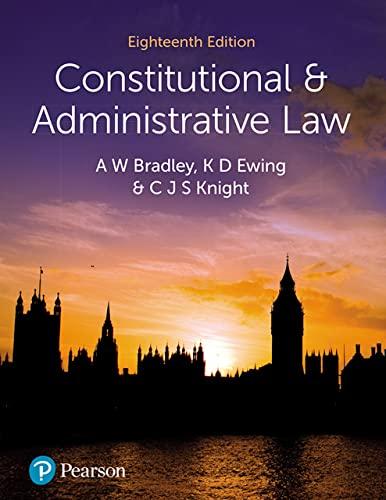Question
Problem 22.3 On March 1, Credit Bank advanced a $100,000 short-term loan to Debbie Debtor for use in Debbie's construction business. Debbie undertook to repay
Problem 22.3
On March 1, Credit Bank advanced a $100,000 short-term loan to Debbie Debtor for use in Debbie's construction business. Debbie undertook to repay the loan by August 1. During June and July, Debbie performed construction work for Peter Payor for the price of $110,000. She completed the work on July 15, and Peter's payment for the work was due on July 31. The amount p. 918that Peter owed Debbie was exactly equal to Debbie's debt to Credit Bank for the loan and interest, so on July 15, Debbie and Peter agreed that Peter would not make this payment to Debbie, but would instead pay the money to Credit Bank. On July 20, Debbie notified Credit Bank that she had arranged for Peter to pay the $110,000 to it by August 1 and asked Credit Bank whether that arrangement was acceptable to it. Credit Bank acquiesced.
On July 25, Debbie agreed with Peter to give him a discount on the price of the construction work, reducing the price to $100,000. On July 31, Peter paid $100,000 to Credit Bank. Debbie is in financial difficulty and is unable to pay anybody anything. Does Credit Bank have the right to demand an additional $10,000 from Peter?
Problem 22.3 presents an interesting question that depends on more than one principle.
1. First, consider whether Credit Bank is the intended beneficiary of the contract between Debbie and Peter, which requires an interpretation of the contract in the context of the entire multi-part transaction. Analyzing this segment of the problem requires an understanding of Lawrence v. Fox, digested on pages 204 and 205.
2.Next, consider the modification. That likely calls for an application of Restatement 311 (page 917). Consider at what point the benefit of the agreement between Debbie and Peter vested in Credit Bank and what effect that may have had on the rights and interests of Debbie and Peter.
Definition: ("Vesting" is the point in time when the rights and interests arising from legal ownership of something are acquired by another party. At the moment those rights and interests pass from the original owner to the next, they are "vested" in the second party. Vesting is discussed in the casebook on page 917.)
Step by Step Solution
There are 3 Steps involved in it
Step: 1

Get Instant Access to Expert-Tailored Solutions
See step-by-step solutions with expert insights and AI powered tools for academic success
Step: 2

Step: 3

Ace Your Homework with AI
Get the answers you need in no time with our AI-driven, step-by-step assistance
Get Started


